一般现在时的特殊疑问句
- 格式:ppt
- 大小:312.00 KB
- 文档页数:16
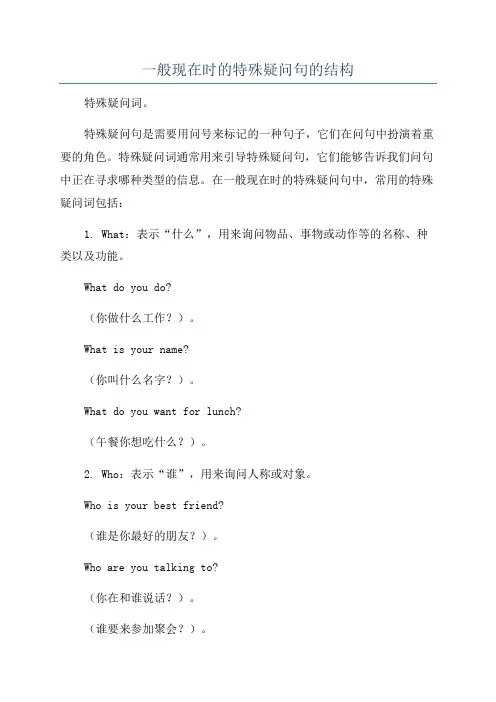
一般现在时的特殊疑问句的结构特殊疑问词。
特殊疑问句是需要用问号来标记的一种句子,它们在问句中扮演着重要的角色。
特殊疑问词通常用来引导特殊疑问句,它们能够告诉我们问句中正在寻求哪种类型的信息。
在一般现在时的特殊疑问句中,常用的特殊疑问词包括:1. What:表示“什么”,用来询问物品、事物或动作等的名称、种类以及功能。
What do you do?(你做什么工作?)。
What is your name?(你叫什么名字?)。
What do you want for lunch?(午餐你想吃什么?)。
2. Who:表示“谁”,用来询问人称或对象。
Who is your best friend?(谁是你最好的朋友?)。
Who are you talking to?(你在和谁说话?)。
(谁要来参加聚会?)。
3. Where:表示“哪里”,用来询问地方或位置。
Where is the library?(图书馆在哪里?)。
Where do you live?(你住在哪里?)。
Where did you go for your holidays?(你去哪里度假了?)。
4. When:表示“什么时候”,用来询问时间或事件发生的时间。
When do you have class?(你什么时候上课?)。
When did you wake up this morning?(你今天早上什么时候起床的?)。
When are you going to the airport?(你什么时候去机场?)。
5. Why:表示“为什么”,用来询问原因或理由。
Why did you leave your last job?(为什么你离开了上一个工作岗位?)。
Why do you like this book?(你为什么喜欢这本书?)。
Why don't you eat meat?(你为什么不吃肉?)。
注意事项。
1.在一般现在时的疑问句中,助动词为do,主语为第三人称单数时,应该使用does。
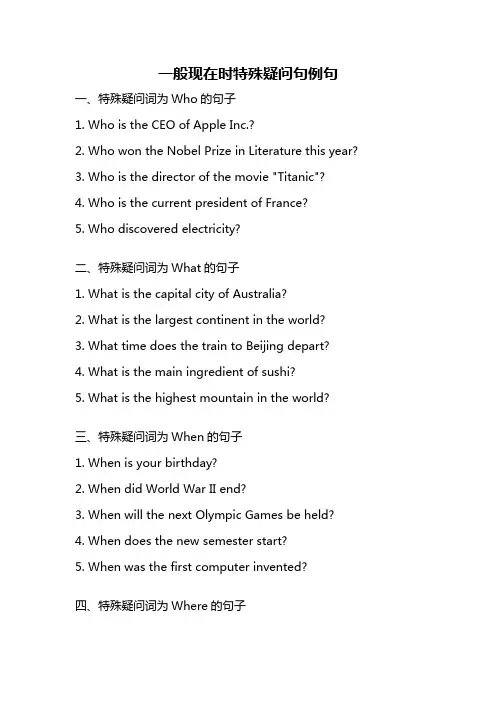
一般现在时特殊疑问句例句一、特殊疑问词为Who的句子1. Who is the CEO of Apple Inc.?2. Who won the Nobel Prize in Literature this year?3. Who is the director of the movie "Titanic"?4. Who is the current president of France?5. Who discovered electricity?二、特殊疑问词为What的句子1. What is the capital city of Australia?2. What is the largest continent in the world?3. What time does the train to Beijing depart?4. What is the main ingredient of sushi?5. What is the highest mountain in the world?三、特殊疑问词为When的句子1. When is your birthday?2. When did World War II end?3. When will the next Olympic Games be held?4. When does the new semester start?5. When was the first computer invented?四、特殊疑问词为Where的句子1. Where is the nearest post office?2. Where can I find a good restaurant around here?3. Where did you go on your last vacation?4. Where is the Eiffel Tower located?5. Where can I buy tickets for the concert?五、特殊疑问词为Why的句子1. Why did you choose to study abroad?2. Why is the sky blue?3. Why do birds fly south for the winter?4. Why did the company decide to close down?5. Why is it important to exercise regularly?六、特殊疑问词为How的句子1. How do you make a chocolate cake?2. How long does it take to get to the airport from here?3. How did you learn to speak English so fluently?4. How can I improve my writing skills?5. How does a microwave oven work?七、特殊疑问词为Which的句子1. Which is your favorite color?2. Which book are you currently reading?3. Which country won the World Cup last year?4. Which team won the Super Bowl this year?5. Which movie won the Best Picture at the Oscars?八、特殊疑问词为Whose的句子1. Whose car is parked in front of the house?2. Whose idea was it to go hiking this weekend?3. Whose phone is ringing?4. Whose dog is barking outside?5. Whose turn is it to do the dishes?九、特殊疑问词为How many的句子1. How many students are in your class?2. How many books have you read this year?3. How many languages can you speak?4. How many hours of sleep do you get each night?5. How many people attended the concert last night?十、特殊疑问词为How much的句子1. How much does a ticket to the concert cost?2. How much money do you have in your wallet?3. How much does a cup of coffee cost at this cafe?4. How much time do you spend studying every day?5. How much does it cost to rent an apartment in this city?。
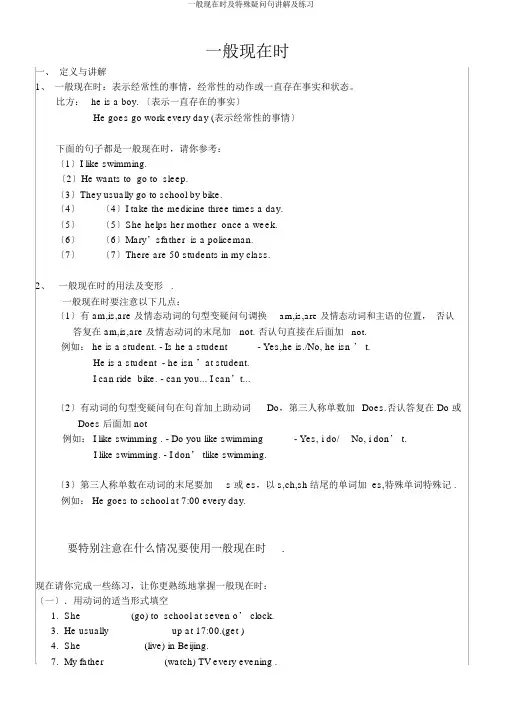
一般现在时一、定义与讲解1、一般现在时:表示经常性的事情,经常性的动作或一直存在事实和状态。
比方:he is a boy. 〔表示一直存在的事实〕He goes go work every day (表示经常性的事情〕下面的句子都是一般现在时,请你参考:〔1〕I like swimming.〔2〕He wants to go to sleep.〔3〕They usually go to school by bike.〔4〕〔4〕I take the medicine three times a day.〔5〕〔5〕She helps her mother once a week.〔6〕〔6〕Mary’sfather is a policeman.〔7〕〔7〕There are 50 students in my class.2、一般现在时的用法及变形.一般现在时要注意以下几点:〔1〕有 am,is,are 及情态动词的句型变疑问句调换am,is,are 及情态动词和主语的位置,否认答复在 am,is,are 及情态动词的末尾加not. 否认句直接在后面加not.例如: he is a student. - Is he a student - Yes,he is./No, he isn ’ t.He is a student - he isn ’at student.I can ride bike. - can you... I can’t...〔2〕有动词的句型变疑问句在句首加上助动词Do,第三人称单数加Does.否认答复在 Do 或Does 后面加 not例如: I like swimming . - Do you like swimming - Yes, i do/ No, i don’ t.I like swimming. - I don’ tlike swimming.〔3〕第三人称单数在动词的末尾要加s 或 es,以 s,ch,sh结尾的单词加 es,特殊单词特殊记 .例如: He goes to school at 7:00 every day.要特别注意在什么情况要使用一般现在时.现在请你完成一些练习,让你更熟练地掌握一般现在时:〔一〕.用动词的适当形式填空1.She _________(go) to school at seven o’ clock.3.He usually ___________ up at 17:00.(get )4.She ___________ (live) in Beijing.7.My father __________ (watch) TV every evening .9.________ Amy _________ (read) English every day10. Chen Jie sometimes _________(go)to the park with her sister.〔二〕 .选择填空1. I want____homework now.A. doingB. to doC. to do myD. do my2.It's time______.A. go to schoolB. play gamesC. to go homeD. to do my homeworks3.______go and help her.A. Let's meB. Let's usC. Let'sD. Let's to4.Do they have a new car Yes,_____.A .they are have C. they don't D. they do5.He often _________ supper at 6:00 in the evening.A. haveB. has c. is having D. is eating6. We _____________ any Chinese classes on Friday.A. are havingB. aren ’thavingC. don’t haveD. are have〔三〕、用括号内动词的适当形式填空。
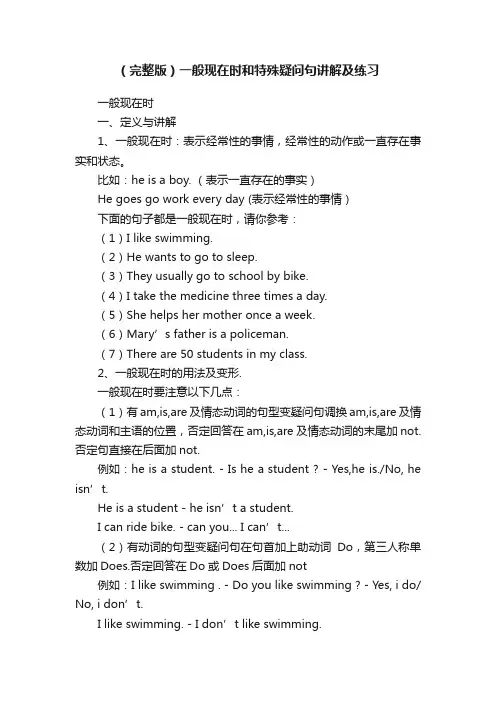
(完整版)一般现在时和特殊疑问句讲解及练习一般现在时一、定义与讲解1、一般现在时:表示经常性的事情,经常性的动作或一直存在事实和状态。
比如:he is a boy. (表示一直存在的事实)He goes go work every day (表示经常性的事情)下面的句子都是一般现在时,请你参考:(1)I like swimming.(2)He wants to go to sleep.(3)They usually go to school by bike.(4)I take the medicine three times a day.(5)She helps her mother once a week.(6)Mary’s father is a policeman.(7)There are 50 students in my class.2、一般现在时的用法及变形.一般现在时要注意以下几点:(1)有am,is,are及情态动词的句型变疑问句调换am,is,are及情态动词和主语的位置,否定回答在am,is,are及情态动词的末尾加not.否定句直接在后面加not.例如:he is a student. - Is he a student ? - Yes,he is./No, he isn’t.He is a student - he isn’t a student.I can ride bike. - can you... I can’t...(2)有动词的句型变疑问句在句首加上助动词Do,第三人称单数加Does.否定回答在Do或Does后面加not例如:I like swimming . - Do you like swimming ? - Yes, i do/ No, i don’t.I like swimming. - I don’t like swimming.(3)第三人称单数在动词的末尾要加s或es,以s,ch,sh结尾的单词加es,特殊单词特殊记.例如:He goes to school at 7:00 every day.要特别注意在什么情况要使用一般现在时.现在请你完成一些练习,让你更熟练地掌握一般现在时:(一).用动词的适当形式填空1. She _________(go) to school at seven o’clock.3. He usually ___________ up at 17:00.(get )4. She ___________ (live) in Beijing.7. My father __________ (watch) TV every evening .9.________ Amy _________ (read) English every day10. Chen Jie sometimes _________(go)to the park with her sister.(二).选择填空1.I want____homework now.A. doingB. to doC. to do myD. do my2.It's time______.A. go to schoolB. play gamesC. to go homeD. to do my homeworks3.______go and help her.A. Let's meB. Let's usC. Let'sD. Let's to4.Do they have a new car? Yes,_____.A .they are B.they have C. they don't D. they do5.He often _________ supper at 6:00 in the evening.A. haveB. has c. is having D. is eating6. We _____________ any Chinese classes on Friday.A. are havingB. aren’t havingC. don’t haveD. are have(三)、用括号内动词的适当形式填空。
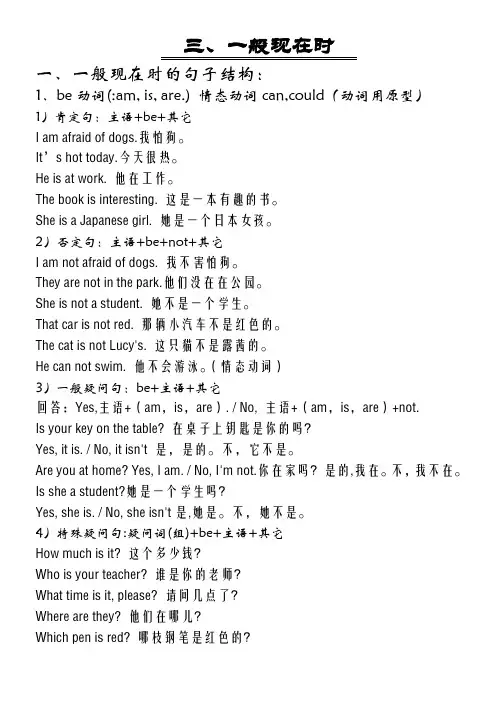
三、一般现在时一、一般现在时的句子结构:1、be动词(:am, is, are.) 情态动词can,could(动词用原型)1)肯定句:主语+be+其它I am afraid of dogs.我怕狗。
It’s hot today.今天很热。
He is at work. 他在工作。
The book is interesting. 这是一本有趣的书。
She is a Japanese girl. 她是一个日本女孩。
2)否定句:主语+be+not+其它I am not afraid of dogs. 我不害怕狗。
They are not in the park.他们没在在公园。
She is not a student. 她不是一个学生。
That car is not red. 那辆小汽车不是红色的。
The cat is not Lucy's. 这只猫不是露茜的。
He can not swim. 他不会游泳。
(情态动词)3)一般疑问句:be+主语+其它回答:Yes,主语+(am,is,are). / No, 主语+(am,is,are)+not.Is your key on the table? 在桌子上钥匘是你的吗?Yes, it is. / No, it isn't 是,是的。
不,它不是。
Are you at home? Yes, I am. / No, I'm not.你在家吗?是的,我在。
不,我不在。
Is she a student?她是一个学生吗?Yes, she is. / No, she isn't是,她是。
不,她不是。
4)特殊疑问句:疑问词(组)+be+主语+其它How much is it? 这个多少钱?Who is your teacher? 谁是你的老师?What time is it, please? 请问几点了?Where are they? 他们在哪儿?Which pen is red? 哪枝钢笔是红色的?What's your favorite subject? 你最喜爱的科目是什么?How is the weather today? = What's the weather like today? 今天天气如何?2、实意动词(单数非第三人称,单数第三人称)1)、单数非第三人称(1)肯定句:主语+动词原形+其它We get up at 7:00 every morning. 我们每天早上7点起床。
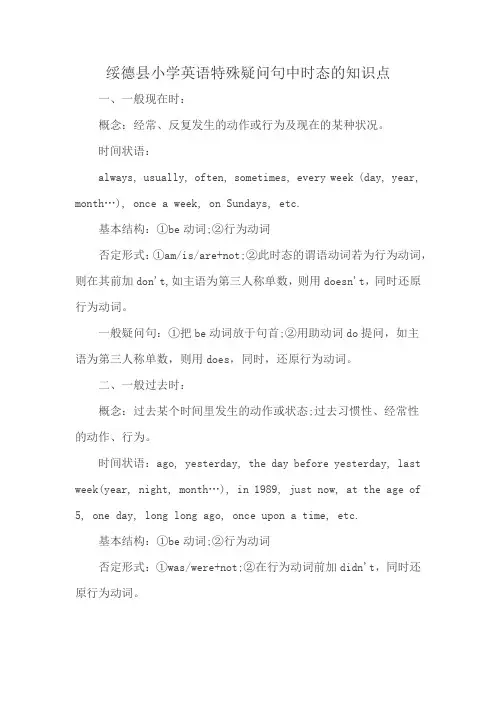
绥德县小学英语特殊疑问句中时态的知识点一、一般现在时:概念:经常、反复发生的动作或行为及现在的某种状况。
时间状语:always, usually, often, sometimes, every week (day, year, month…), once a week, on Sundays, etc.基本结构:①be动词;②行为动词否定形式:①am/is/are+not;②此时态的谓语动词若为行为动词,则在其前加don't,如主语为第三人称单数,则用doesn't,同时还原行为动词。
一般疑问句:①把be动词放于句首;②用助动词do提问,如主语为第三人称单数,则用does,同时,还原行为动词。
二、一般过去时:概念:过去某个时间里发生的动作或状态;过去习惯性、经常性的动作、行为。
时间状语:ago, yesterday, the day before yesterday, last week(year, night, month…), in 1989, just now, at the age of 5, one day, long long ago, once upon a time, etc.基本结构:①be动词;②行为动词否定形式:①was/were+not;②在行为动词前加didn't,同时还原行为动词。
一般疑问句:①was或were放于句首;②用助动词do的过去式did 提问,同时还原行为动词。
三、现在进行时:概念:表示现阶段或说话时正在进行的动作及行为。
时间状语:now, at this time, these days, etc.基本结构:am/is/are+doing否定形式:am/is/are+not+doing.一般疑问句:把be动词放于句首。
四、过去进行时:概念:表示过去某段时间或某一时刻正在发生或进行的行为或动作。
时间状语:at this time yesterday, at that time或以when 引导的谓语动词是一般过去时的时间状语等。
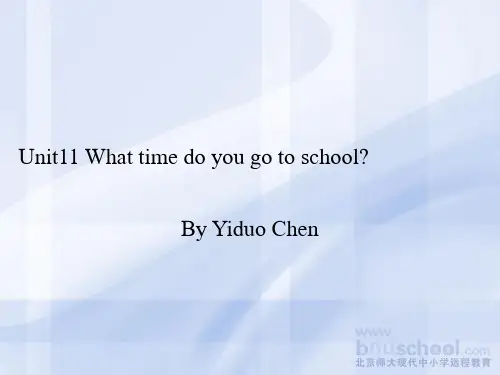
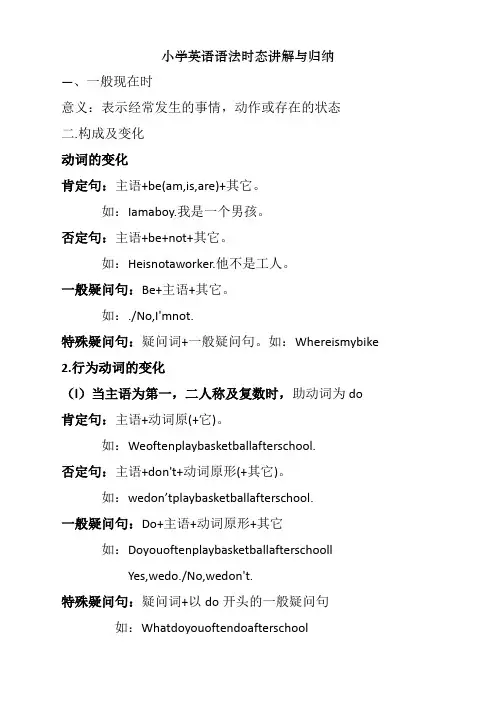
小学英语语法时态讲解与归纳—、一般现在时意义:表示经常发生的事情,动作或存在的状态二.构成及变化动词的变化肯定句:主语+be(am,is,are)+其它。
如:Iamaboy.我是一个男孩。
否定句:主语+be+not+其它。
如:Heisnotaworker.他不是工人。
一般疑问句:Be+主语+其它。
如:./No,I'mnot.特殊疑问句:疑问词+一般疑问句。
如:Whereismybike 2.行为动词的变化(l)当主语为第一,二人称及复数时,助动词为do肯定句:主语+动词原(+它)。
如:Weoftenplaybasketballafterschool.否定句:主语+don't+动词原形(+其它)。
如:wedon’tplaybasketballafterschool.一般疑问句:Do+主语+动词原形+其它如:DoyouoftenplaybasketballafterschoollYes,wedo./No,wedon't.特殊疑问句:疑问词+以do开头的一般疑问句如:Whatdoyouoftendoafterschool(2)当主语为第三人称单数时,助动词为does肯定句:主语+动词三单式(+其它)。
如:Heswimswell.否定句:主语+doesn’t+动词原形(+其它)。
如:Hedoesn’tswim well.一般疑问句:Does+主语+动词原形+其它。
如:DoesheswimwellYes,hedoes./No,hedoesn't.特殊疑问句:疑问词+以does开头的一般疑问句如:Howdoesyourfathergotowork三.第三人称单数的动词变化规则(只有在第三人称为主语的肯定句中,动词才用三单式)(1)多数动词直接加s:runs getslikescolletstakesplays climbs…….(2)结尾是s,x,sh,ch,o,前为辅音字母,结尾加es:watches teaches goes does washes crossesmixes brushes(3)动词末尾y前为辅音:将y改为i加es:study→studiesfly→fliescarry→carriescry→cries但在y前如果为元音则直接加s:buyssays四.时间标志:always,usually,often,so metimes,every…一般现在时练习Heoften (have)dinnerathome. DanielandTommy (be)inClassOne.We (notwatch)TVonMonday.Nick (notgo)tothezooonSunday.they (like)theWorldCupWhattheyoften (do)onSaturdaysyourparents(read)newspaperseverydayThegirl (teach)usEnglishonSundays.SheandI(take)awalktogethereveryevening.There(be)somewaterinthebottle.Mike____(like)cooking.They____ (have)thesamehobby.Myaunt____(look)afterherbabycarefully. Youalways______(do)yourhomeworkwell.I (be)’mstayinginbed.She (go)toschoolfromMondaytoFriday.LiuTao_____(do)notlikePE.Thechildoften_____(watch)TVintheevening. SuHaiandSuYang____(have)eightlessonsthisterm.-Whatday___(be)ittoday-It’sSaturdayWinter, spring, summer and autumn (be)seasons.Danny (take) off his T-shirt now.Today (teach) a science lesson.Jenny and I (live) in Canada.Jenny (want) to go to school in chinaLet me (help) youShe eats a sandwich(总是)Li Ming goes to school by bicycle(有时)。
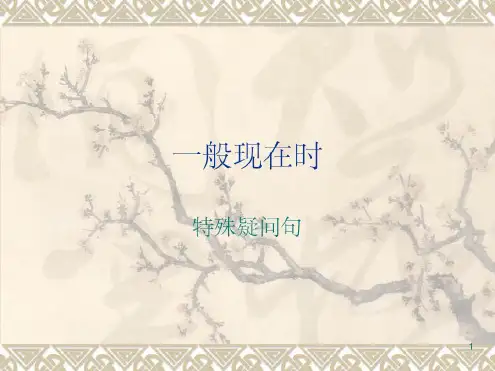
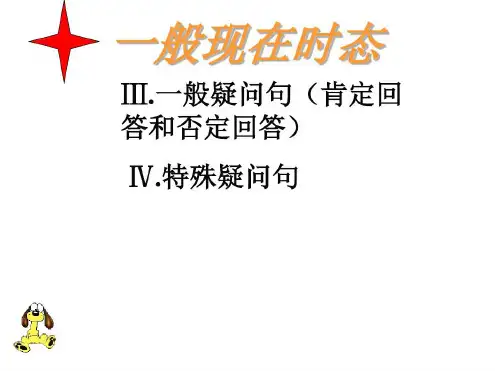
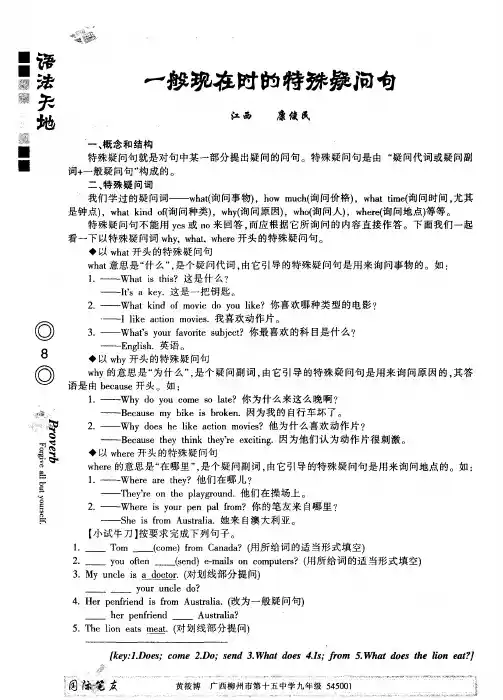
小学英语语法时态讲解与归纳—、一般现在时意义:表示经常发生的事情,动作或存在的状态二。
构成及变化1.be动词的变化肯定句:主语+be(am,is,are)+其它。
如:I am a boy。
我是一个男孩。
否定句:主语+be+not+其它。
如:He is not a worker.他不是工人.一般疑问句:Be+主语+其它。
如:-Are you a student?-Yes。
I am。
/No,I’m not.特殊疑问句:疑问词+一般疑问句。
如:Where is my bike?2.行为动词的变化(l)当主语为第一,二人称及复数时,助动词为do肯定句:主语+动词原(+它)。
如:We often play basketball after school。
否定句:主语+don’t+动词原形(+其它).如:we don’t play basketball after school。
一般疑问句:Do+主语+动词原形+其它?如:Do you often play basketball after school l?Yes,we do./No,we don’t.特殊疑问句:疑问词+以do开头的一般疑问句?如:What do you often do after school?(2)当主语为第三人称单数时,助动词为does肯定句:主语+动词三单式(+其它).如:He swims well。
否定句:主语+doesn’t+动词原形(+其它)。
如:He doesn't swim well.一般疑问句:Does+主语+动词原形+其它。
如:Does he swim well?Yes,he does。
/No,he doesn't.特殊疑问句:疑问词+以does开头的一般疑问句?如:How does your father go to work?三.第三人称单数的动词变化规则(只有在第三人称为主语的肯定句中,动词才用三单式)(1)多数动词直接加s:runs gets likes collets takes plays climbs…….(2)结尾是s,x,sh,ch,o,前为辅音字母,结尾加es:watches teaches goes does washes crossesmixes brushes(3)动词末尾y前为辅音:将y改为i加es:study→studies fly→flies carry→carries cry→cries但在y前如果为元音则直接加s:buys says四.时间标志:always,usually,often,sometimes,every…一般现在时练习He often (have) dinner at home.Daniel and Tommy (be) in Class One。
小学英语语法时态讲解与归纳—、一般现在时意义:表示经常发生的事情,动作或存在的状态二。
构成及变化1.be动词的变化肯定句:主语+be(am,is,are)+其它。
如:I am a boy。
我是一个男孩。
否定句:主语+be+not+其它.如:He is not a worker。
他不是工人。
一般疑问句:Be+主语+其它。
如:-Are you a student?—Yes.I am。
/No,I'm not。
特殊疑问句:疑问词+一般疑问句。
如:Where is my bike?2。
行为动词的变化(l)当主语为第一,二人称及复数时,助动词为do肯定句:主语+动词原(+它)。
如:We often play basketball after school。
否定句:主语+don’t+动词原形(+其它)。
如:we don't play basketball after school.一般疑问句:Do+主语+动词原形+其它?如:Do you often play basketball after school l?Yes,we do./No,we don't。
特殊疑问句:疑问词+以do开头的一般疑问句?如:What do you often do after school?(2)当主语为第三人称单数时,助动词为does肯定句:主语+动词三单式(+其它).如:He swims well.否定句:主语+doesn’t+动词原形(+其它)。
如:He doesn’t swim well.一般疑问句:Does+主语+动词原形+其它.如:Does he swim well?Yes,he does。
/No,he doesn't。
特殊疑问句:疑问词+以does开头的一般疑问句?如:How does your father go to work?三.第三人称单数的动词变化规则(只有在第三人称为主语的肯定句中,动词才用三单式)(1)多数动词直接加s:runs gets likes collets takes plays climbs…….(2)结尾是s,x,sh,ch,o,前为辅音字母,结尾加es:watches teaches goes does washes crossesmixes brushes(3)动词末尾y前为辅音:将y改为i加es:study→studies fly→flies carry→carries cry→cries但在y前如果为元音则直接加s:buys says四.时间标志:always,usually,often,sometimes,every…一般现在时练习He often (have) dinner at home.Daniel and Tommy (be) in Class One.We (not watch) TV on Monday。
一般现在时定义:一般现在时:表示通常性、规律性、习惯性的状态或者动作(有时间规律发生的事件)的一种时间状态。
句子结构当主语是第三人称单数时:肯定句:主语+动词的第三人称单数+其他否定句:主语+doesn't+动词原形+其他一般疑问句:Does+主语+动词原形+其他肯定回答:Yes,主语+does否定回答:No,主语+doesn't特殊疑问句:特殊疑问词+一般疑问句当主语不是第三人称单数时:肯定句:主语+动词原形+其他否定句:主语+don't+动词原形+其他一般疑问句:Do+主语+动词原形+其他肯定回答:Yes,主语+do否定回答:No,主语+don't要注意,句式结构错则全局都错。
变化规律具体运用1.表示经常的或习惯性的动作,常与表示频率的时间状语连用。
时间状语: always, usually,regularly,everymorning/night/evening/day/week/year,often,sometimes,occasionally ,from time to time,twice a week,rarely,seldom,once a month, hardly, ever,never.e.g. I leave home for school at 7:00 every morning.2.表示主语具备的性格、能力、特征和状态。
e.g. I don't want so much.Ann Wang writes good English but does not speak well.比较:Now I put the sugar in the cup.I am doing my homework now.3.表示客观事实和普遍真理。
e.g The earth moves around the sun.Shanghai lies in the east of China.4.在时间状语从句和条件状语从句中,常用一般现在时代替将来时。
一般现在时定义结构肯定句否定句一般疑问句特殊疑问句和时间标志词一般现在时(Simple Present Tense)用于描述经常性、习惯性或普遍真理的动作、状态或情况。
以下是一般现在时的定义、结构以及肯定句、否定句、一般疑问句和特殊疑问句的例子,以及一些常见的时间标志词。
定义:一般现在时表示经常性、习惯性或普遍真理的动作、状态或情况。
结构:主语 + 动词原形(第三人称单数要加-s/-es)+ 其他成分肯定句示例:1. I play tennis every Saturday.(我每个星期六打网球。
)2. He likes to read books in his free time.(他喜欢在闲暇时间阅读书籍。
)否定句示例:1. She does not eat meat.(她不吃肉。
)2. We don't live in the city.(我们不住在城市里。
)一般疑问句示例:1. Do you like ice cream?(你喜欢冰淇淋吗?)2. Does he go to school by bus?(他坐公交去学校吗?)特殊疑问句示例:1. What time do you usually wake up in the morning?(早上你通常几点醒来?)2. Where does she work?(她在哪工作?)常见的时间标志词:- always(总是)- often(经常)- usually(通常)- sometimes(有时候)- every day/week/month/year(每天/每周/每月/每年)- on Mondays/Tuesdays, etc.(在星期一/星期二等)。